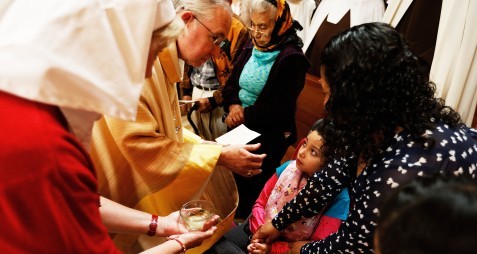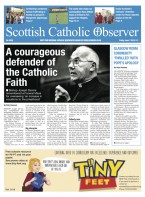March 29 | ![]() 0 COMMENTS
0 COMMENTS ![]() print
print

Rediscovering the Sacraments: Bringing peace to our end
In the second in the series, Fr Peter Morris looks at why the Anointing of the Sick should be administered early
A few months in as a priest, I was called to the hospice in Clapham, London, to anoint a dying, elderly man. He had stopped communicating for about a week.
After speaking with the family, I invited them to gather round to pray through the Rite of Anointing. Leaning in close, I told him what was about to happen.
Not long into our prayer the elderly man gently opened his eyes. He looked at me, dressed in my collar and wearing a stole. His faced beamed, smiling from ear to ear; he rose up and hugged me. There wasn’t a dry eye in the room.
I’m sure other priests can share experiences about the wonders of this Sacrament, which include great recoveries and peaceful deaths.
Pastoral care
There are also stories, which are sad and unfortunate. Another such call came to me on a busy day.
When I finally managed to get to the hospice, the elderly lady had already died, only an hour after they made the call but before I received the message. Nobody else was there. I sat with her remains, praying the prayers for the dead with a heavy heart.
The great Sacrament of Anointing is only part of a wider ministry of the Church, which includes all the faithful, in comforting those who suffer. In the General Introduction to the Pastoral Care of the Sick, we are told that: “The family and friends of the sick and those who take care of them in any way have a special share in this ministry of comfort.
In particular, it is their task to strengthen the sick with words of faith and by praying with them, to commend them to the suffering and glorified Lord, and to encourage them to contribute to the well-being of the people of God by associating themselves willingly with Christ’s passion and death.” (paragraph 34)
Good communication
The priest, therefore, should not be the first one the sick person meets in their illness who is willing to pray with them. Not everyone, however, is blessed with a family who still believes.
Because of this, the Church relies on good communication between hospital staff, lay and ordained hospital chaplains and extraordinary ministers of the Eucharist. In our current context of data protection, this has become challenging but is not impossible.
In our society, the dying and the dead are kept out of sight. To the world, they are a horror story at worst, or, at best, an unwelcome reminder that this is the fate that awaits us all.
When the Church is at its best, it does not shy away from looking on these people with kindness and reverence; to assure them that they are part of the Body of Christ and that they are not forgotten.
Sins forgiven
In the Letter of St James we are advised: “Are any among you sick? They should call for the elders of the church and have them pray over them, anointing them with oil in the name of the Lord.
The prayer of faith will save the sick, and the Lord will raise them up; and anyone who has committed sins will be forgiven.” (James 5: 14-15)
It is because of this simple instruction that the Church understands the importance of calling for priests at the appropriate time to administer the wonderful Sacrament of the Sick.
Before the Second Vatican Council, the Church only administered this Sacrament to the dying and so was called informally ‘The Last Rites.’ However, following Vatican II, those who are sick can be given this Sacrament.
Great Sacrament
This is in continuity with the teaching of the Council of Trent, that the Sacrament ‘at times, when expedient for the welfare of the soul, restores bodily health.’ It is a Sacrament of healing, not only a gateway for the dying.
The faithful should thus have confidence to call upon their priests to administer this great Sacrament at an earlier stage in illness and in the dying process.
It would be far better for the dying person if they were still conscious and able to respond when the Sacrament is being celebrated—not least because they will also be able to receive Holy Communion as Viaticum during the celebration.
Healing does not always mean curing.
Doubt our Faith
The effects of the Sacrament can be the grace to endure the coming suffering and discomfort with dignity and serenity. It is not a coincidence that, when the Sacrament of the Sick is being celebrated as part of a Mass, an option for the Scripture readings is from the Gospel of Mark (4:35-41).
Jesus sleeps in the boat on the lake, when a storm arises. His disciples wake Him up in a panic and He rebukes the wind, saying, “Peace! Be still!”
Having an illness or suffering the deleterious effects of old age can produce in us a storm of anxieties and temptations to doubt or even reject our Faith in God’s personal abiding love.
The grace of the Holy Spirit given to us in the Sacrament of the Sick is described as follows: “By this grace the whole person is helped and saved, sustained by trust in God, and strengthened against temptations of the Evil One and against anxiety over death. Thus the sick person is able not only to bear suffering bravely, but also to fight against it.” (General Introduction to Pastoral Care of the Sick, paragraph 6).
Radiating peace
In the prayer of Faith, the plea of the gathered people of God (see Introduction to Anointing of the Sick, paragraph 105), wakes Jesus up, as it were, amid the winds raging inside both the sick person and indeed all around them in the loved ones who are distraught by their illness.
He calms the storm, He brings peace—a peace that radiates outward like ripples in water following the dropping of a pebble into it.
Of course, there are times that Jesus restores people to full health through this Sacrament, where we see among ourselves the continued ministry of Christ, who laid hands on and healed so many people while He walked the earth.
In 1985, the Redemptorists preached a mission across the city of Aberdeen. In a small parish there, a mother was coming to her wits’ end with her baby son.
He was very unwell and just would not stop crying. One of the missioners visited the house and (ignoring Canon Law, which advises there is no need for anointing children who have not reached the age of reason) anointed the child. Almost instantly, peace descended.
The child recovered and has grown into the young man who writes this article. Deo gratias!










